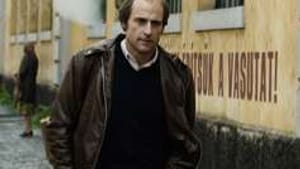Stay in the Loop
BSR publishes on a weekly schedule, with an email newsletter every Wednesday and Thursday morning. There’s no paywall, and subscribing is always free.
Seduced (by James Bond) and abandoned
"Tinker Tailor Soldier Spy' (3rd review)

The complexity of Tomas Alfredson's Tinker, Tailor, Soldier, Spy seems to have confounded my BSR colleagues Judy Weightman and Dan Rottenberg. On the surface this spy film, set in the early '70s and based on John le Carré's novel of the same name, concerns the hunt for a Soviet mole who has penetrated the very highest ranks of the British secret service, colloquially known as "The Circus." Ostensibly the central character is George Smiley, retired arch spy and wallflower (played by Gary Oldman), who is brought out of retirement to find the villain.
But actually the key to this Byzantine story lies beneath the surface— specifically in its minor characters. Tinker, Tailor is certainly a tale of a stagnant elite obsessed by its declining international prestige. But it's also about the toll of a profession that we spy fans— and spies themselves— try to imbue with a glamour that quickly turns to dross in the sunlight.
Every spy in the film is warped by the profession. None seems happy. Indeed, their few jolly moments seem forced. Colin Firth, as Bill Haydon, rides his bike around the Circus's secret compound, cracking wise and leering at secretaries. But his posturing feels a bit off, uncomfortably so.
Straining for merriment
Then there is the droll Connie Sachs (Kathy Burke), a disgraced and disheveled Circus researcher in retirement at Oxford, who attempts to look back at her time with the Circus as a romantic adventure. But it seems clear that she must do so to maintain her sanity—she has nothing else.
The sad tale of the hyper-patriotic field agent Jim Prideaux (Mark Strong), which we glimpse only in passing, is actually the heart of the movie. After "doing his duty," risking his life in a foreign mission gone horribly wrong, and being brutally tortured, Prideaux returns to Britain, only to be turned out by his Circus bosses with a pat on the head, £1,000 and a mediocre car.
In an expertly rendered flashback, which is returned to three times throughout the film, we see a Circus Christmas party before the mole hunt turned the office on its head. The scene is not to be found in the novel, but it's a excellent addition, allowing us to see the characters cutting loose a bit. We're even treated to the only smile we ever get out of Smiley, as he looks at his wife Ann (whose face we never see).
Gay boyfriend
But even the party feels claustrophobic, as the assembled spies drunkenly shout the Soviet national anthem, led by a Santa Claus in a Lenin mask. Each further scene reveals the treacherous seeds that have already been planted, poisoning the agency's liquor-induced revelry.
The pitiless sacrifice demanded of the spies is epitomized by the film's choice to make one character gay, where his literary counterpart is involved with a young woman half his age. In le Carré's novel we see the spy's profession slowly exert a horrible gravitational pull on his perceptions of their relationship, as the general atmosphere of mistrust leads him to obsesses over his girlfriend's suspected sexual treacheries.
In the film, which lacks the space to allow this subplot to leisurely unfold, his same-sex relationship can be viewed as shorthand for the toll the Circus takes on one's personal life. In the film, the spy is induced to give up his live-in boyfriend for fear that the relationship will be used against him, in a way a girlfriend couldn't be. His altered sexual proclivities, and the love he is forced to sacrifice, further reinforce the intelligence community's twisted priorities. Even the film's brief vision of Russian spies reveals a world of spiteful personal betrayal, marital infidelity and alcoholic excess.
Lonely at the top
Near the film's conclusion, a minor character informs Smiley that he is getting out of the spy game: "I want a family, thank you. I don't want to end up like you lot." This handsome young man, who perhaps got into the espionage game out of some sense of James Bond adventure, has seen through the charade. And it's hard to argue with his logic.
By film's end, most every character has been betrayed or forced to betray. Almost every loving relationship has been shattered, sacrificed to spycraft. And finally it ends with Smiley sitting at the top of the Circus, triumphant, at work, and alone.♦
To read another review by Judy Weightman, click here.
To read a related commentary by Dan Rottenberg, click here.
To read a response, click
But actually the key to this Byzantine story lies beneath the surface— specifically in its minor characters. Tinker, Tailor is certainly a tale of a stagnant elite obsessed by its declining international prestige. But it's also about the toll of a profession that we spy fans— and spies themselves— try to imbue with a glamour that quickly turns to dross in the sunlight.
Every spy in the film is warped by the profession. None seems happy. Indeed, their few jolly moments seem forced. Colin Firth, as Bill Haydon, rides his bike around the Circus's secret compound, cracking wise and leering at secretaries. But his posturing feels a bit off, uncomfortably so.
Straining for merriment
Then there is the droll Connie Sachs (Kathy Burke), a disgraced and disheveled Circus researcher in retirement at Oxford, who attempts to look back at her time with the Circus as a romantic adventure. But it seems clear that she must do so to maintain her sanity—she has nothing else.
The sad tale of the hyper-patriotic field agent Jim Prideaux (Mark Strong), which we glimpse only in passing, is actually the heart of the movie. After "doing his duty," risking his life in a foreign mission gone horribly wrong, and being brutally tortured, Prideaux returns to Britain, only to be turned out by his Circus bosses with a pat on the head, £1,000 and a mediocre car.
In an expertly rendered flashback, which is returned to three times throughout the film, we see a Circus Christmas party before the mole hunt turned the office on its head. The scene is not to be found in the novel, but it's a excellent addition, allowing us to see the characters cutting loose a bit. We're even treated to the only smile we ever get out of Smiley, as he looks at his wife Ann (whose face we never see).
Gay boyfriend
But even the party feels claustrophobic, as the assembled spies drunkenly shout the Soviet national anthem, led by a Santa Claus in a Lenin mask. Each further scene reveals the treacherous seeds that have already been planted, poisoning the agency's liquor-induced revelry.
The pitiless sacrifice demanded of the spies is epitomized by the film's choice to make one character gay, where his literary counterpart is involved with a young woman half his age. In le Carré's novel we see the spy's profession slowly exert a horrible gravitational pull on his perceptions of their relationship, as the general atmosphere of mistrust leads him to obsesses over his girlfriend's suspected sexual treacheries.
In the film, which lacks the space to allow this subplot to leisurely unfold, his same-sex relationship can be viewed as shorthand for the toll the Circus takes on one's personal life. In the film, the spy is induced to give up his live-in boyfriend for fear that the relationship will be used against him, in a way a girlfriend couldn't be. His altered sexual proclivities, and the love he is forced to sacrifice, further reinforce the intelligence community's twisted priorities. Even the film's brief vision of Russian spies reveals a world of spiteful personal betrayal, marital infidelity and alcoholic excess.
Lonely at the top
Near the film's conclusion, a minor character informs Smiley that he is getting out of the spy game: "I want a family, thank you. I don't want to end up like you lot." This handsome young man, who perhaps got into the espionage game out of some sense of James Bond adventure, has seen through the charade. And it's hard to argue with his logic.
By film's end, most every character has been betrayed or forced to betray. Almost every loving relationship has been shattered, sacrificed to spycraft. And finally it ends with Smiley sitting at the top of the Circus, triumphant, at work, and alone.♦
To read another review by Judy Weightman, click here.
To read a related commentary by Dan Rottenberg, click here.
To read a response, click
What, When, Where
Tinker Tailor Soldier Spy. A film directed by Tomas Alfredson, from the novel by John Le Carré. At the Ritz East, 125 S. Second Street, (215) 925-7900. For Philadelphia area show times, click here.
Sign up for our newsletter
All of the week's new articles, all in one place. Sign up for the free weekly BSR newsletters, and don't miss a conversation.
 Jake Blumgart
Jake Blumgart